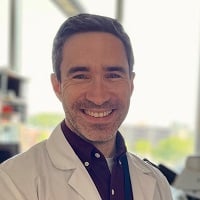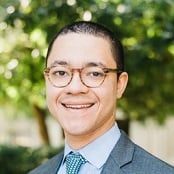Profiles of Current and Former Research Track Fellows
 Timothy Cashman, MD, PhD is a fellow in the research track of the UMass Chan Fellowship in Cardiovascular Medicine. Tim will be graduating in December of 2024 and will join the faculty of the Lewis Katz School of Medicine at Temple University.
Timothy Cashman, MD, PhD is a fellow in the research track of the UMass Chan Fellowship in Cardiovascular Medicine. Tim will be graduating in December of 2024 and will join the faculty of the Lewis Katz School of Medicine at Temple University.
Tim received his bachelor’s degrees in Biochemistry and Art History from Bowdoin College. After his undergraduate education, he worked as a research technician with Drs. Caroline and Geoff Burns at Massachusetts General Hospital, where he investigated cardiac regeneration research in zebrafish. He subsequently completed his MD and PhD degrees at the Icahn School of Medicine at Mount Sinai, where he developed preclinical models of cardiovascular disease using engineered human cardiac tissues with Dr. Kevin Costa, PhD.
When seeking a residency and fellowship, Tim was drawn to UMass Chan for its supportive and approachable environment as well as its clinical and academic rigor. He finished his two-year residency in 2019, then joined the lab of Dr. Chinmay Trivedi, MD, PhD in the Division of Cardiovascular Medicine. With the support of Dr. Trivedi, he investigated the basic science of cardiac development and adult cardiac disease through the lens of epigenetics. He is drawn to epigenetics as it combines genetic and environmental risk factors in the development of cardiac disease, which he finds particularly relevant to the adult cardiology patient population. During his research years, he was funded in large part by the UMass Chan T32 Training Grant. After 3.5 years at the bench, he is excited to be back to full-time clinical medicine during the final stage of his training.
Publications
ResearchGate

Joseph J.B. Tejan, MD is a second year Research Fellow at UMass Chan Medical School and Umass Memorial Medical Center. Dr. Tejan is on the 2+2 research pathway: two years of dedicated research and two years of clinical cardiology fellowship.
Dr. Tejan received his bachelor’s degree in biomedical engineering from Washington University in St. Louis. He subsequently completed his MD at UT Southwestern Medical Center and then moved to Baltimore for Internal Medicine Residency at Johns Hopkins Bayview, which he completed in 2022. He then worked as a hospitalist with the Cardiology Department at Johns Hopkins Hospital for 1 year.
Dr. Tejan joined UMass in 2023 under the mentorship of Dr. Dave McManus with an aim of working on clinical and epidemiological cardiovascular research with a focus on digital health and wearable devices. He is funded as part of the UMass Chan T32 Cardiovascular Training Grant. His research currently focuses on the interaction and integration of extreme heat and heat stress with digital health using novel means of measuring heat. He has become interested in weather due to the cardiovascular physiological effects as well as the day-to-day impact on people now and in the future. During his research time, Dr. Tejan has also been pursuing a Master of Science of Clinical Investigation through the UMass Morningside Graduate School of Biomedical Sciences, allowing him to take classes in biostatistics and epidemiology.
Dr. Tejan continues to be interested in a variety of aspects of Cardiology, and is looking forward to finding future ways of integrating his interest in Environmental Health with his clinical care.
 Khanh-Van Tran, MD, PhD, is a physician-scientist focused on developing effective therapies for patients with cardiovascular disease. Dr. Tran completed a combined research and clinical fellowship in cardiovascular medicine at UMass Chan Medical School in 2021. During her training, she was funded by the T32 grant from the UMass Chan Transdisciplinary Cardiovascular Sciences Training Program. After graduation, she joined the faculty in the Division of Cardiovascular Medicine. Currently, her research focuses on the molecular mechanisms by which epicardial adipose tissue contributes to adverse cardiac remodeling. She uses transcriptomic and proteomic techniques to investigate the role of epicardial adipocytes in immune-mediated electroanatomic remodeling to increase vulnerability to conduction abnormalities. Her goal is to identify novel targets and approaches to advance therapies for patients with cardiometabolic disease.
Khanh-Van Tran, MD, PhD, is a physician-scientist focused on developing effective therapies for patients with cardiovascular disease. Dr. Tran completed a combined research and clinical fellowship in cardiovascular medicine at UMass Chan Medical School in 2021. During her training, she was funded by the T32 grant from the UMass Chan Transdisciplinary Cardiovascular Sciences Training Program. After graduation, she joined the faculty in the Division of Cardiovascular Medicine. Currently, her research focuses on the molecular mechanisms by which epicardial adipose tissue contributes to adverse cardiac remodeling. She uses transcriptomic and proteomic techniques to investigate the role of epicardial adipocytes in immune-mediated electroanatomic remodeling to increase vulnerability to conduction abnormalities. Her goal is to identify novel targets and approaches to advance therapies for patients with cardiometabolic disease.
Current research funding: K23HL161432 (Tran), 2022-2027. The Role of Highly Inflamed Epicardial Adipose Tissue in the Development of Atrial Fibrillation
Representative publications:
-
Kant S, Tran KV, Kvandova M, Caliz AD, Yoo HJ, Learnard H, Dolan AC, Craige SM, Hall JD, Jimenez JM, St Hilaire C, Schulz E, Kroller-Schon S and Keaney JF, Jr. PGC1alpha Regulates the Endothelial Response to Fluid Shear Stress via Telomerase Reverse Transcriptase Control of Heme Oxygenase-1. Arterioscler Thromb Vasc Biol. 2022;42:19-34.
-
Tran KV, Brown EL, DeSouza T, Jespersen NZ, Nandrup-Bus C, Yang Q, Yang Z, Desai A, Min SY, Rojas-Rodriguez R, Lundh M, Feizi A, Willenbrock H, Larsen TJ, Severinsen MCK, Malka K, Mozzicato AM, Deshmukh AS, Emanuelli B, Pedersen BK, Fitzgibbons T, Scheele C, Corvera S, Nielsen S. Human thermogenic adipocyte regulation by the long noncoding RNA LINC00473. Nat Metab. 2020;2(5):397-412.
-
Tran KV, Majka J, Sanghai S, Sardana M, Lessard D, Milstone Z, Tanriverdi K, Freedman JE, Fitzgibbons TP, McManus D. Micro-RNAs Are Related to Epicardial Adipose Tissue in Participants With Atrial Fibrillation: Data From the MiRhythm Study. Front Cardiovasc Med. 2019;6:115.
-
Tran KV, Fitzgibbons T, Min SY, DeSouza T, Corvera S. Distinct adipocyte progenitor cells are associated with regional phenotypes of perivascular aortic fat in mice. Mol Metab. 2018;9:199-206. Epub 2018/02/06. doi: 10.1016/j.molmet.2017.12.014. PubMed PMID: 29396370; PMCID: PMC5869733